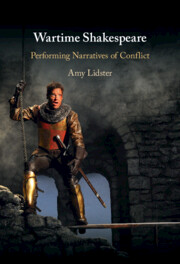Book contents
- Wartime Shakespeare
- Wartime Shakespeare
- Copyright page
- Dedication
- Contents
- Figures
- Acknowledgements
- Note on the Text
- Introduction
- Part I
- Chapter 1 Royal Shakespeare
- Chapter 2 Shakespeare as Propaganda
- Chapter 3 ‘Patriotic’ Shakespeare and Dialectics of Conflict during the French Revolutionary-Napoleonic Wars (1792–1815)
- Interlude
- Part II
- Select Bibliography
- Index
Chapter 3 - ‘Patriotic’ Shakespeare and Dialectics of Conflict during the French Revolutionary-Napoleonic Wars (1792–1815)
from Part I
Published online by Cambridge University Press: 12 October 2023
- Wartime Shakespeare
- Wartime Shakespeare
- Copyright page
- Dedication
- Contents
- Figures
- Acknowledgements
- Note on the Text
- Introduction
- Part I
- Chapter 1 Royal Shakespeare
- Chapter 2 Shakespeare as Propaganda
- Chapter 3 ‘Patriotic’ Shakespeare and Dialectics of Conflict during the French Revolutionary-Napoleonic Wars (1792–1815)
- Interlude
- Part II
- Select Bibliography
- Index
Summary
Chapter 3 examines the fighting over Shakespeare that takes place during the French Revolutionary-Napoleonic Wars (1792–1815). This period of prolonged conflict is characterized by an obsessive interest in position-takings and labelling, such as revolutionary/loyalist and Jacobin/anti-Jacobin; but, as this chapter demonstrates, these wartime binaries are protean. By deploying them we are at risk of under-interpreting the conflict. The performance of Shakespeare at the major and minor theatres in London reveals this distinctive political malleability. The chapter begins by considering pressure points in the conflict when Shakespeare seems to have been loudly mobilized in support of the British war effort – such as the resumption of conflict in 1803 – but concentrates for the most part on the contested political valence of Shakespeare. It examines the opposing political sympathies and theatrical interests of John Philip Kemble and Richard Brinsley Sheridan who were both connected to the Theatre Royal, Drury Lane, as well as the operations of the minor theatres that position Shakespeare within a battle over the democratization of culture and politics that strongly resonates with the period’s domestic and foreign conflicts. The chapter concludes by proposing that ‘conflicting Shakespeares’ become united through the vagaries of patriotism, a powerful and uncertain concept during this period and beyond.
Keywords
- Type
- Chapter
- Information
- Wartime ShakespearePerforming Narratives of Conflict, pp. 105 - 145Publisher: Cambridge University PressPrint publication year: 2023

